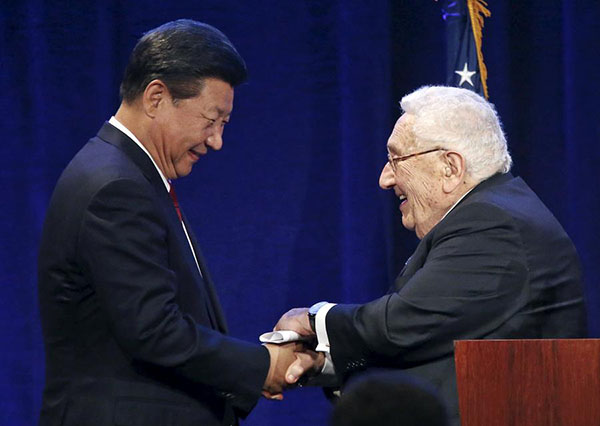How should China, US improve relations on security?
- By Shen Dingli
 0 Comment(s)
0 Comment(s) Print
Print E-mail China.org.cn, September 23, 2015
E-mail China.org.cn, September 23, 2015
|
|
|
President Xi Jinping (L) is introduced by former US National Security Advisor and Secretary of State Henry Kissinger at a speech during a dinner reception in Seattle, Washington, September 22, 2015. [Photo/China Daily] |
Interaction between China and the United States is expanding. Bilateral economic and trade ties have deepened and been mutually beneficial. The China-U.S. security relationship is developing, too. They collaborate on a number of international security issues, including anti-terror initiatives, and nonproliferation.
As the two broaden their security ties, however, they also confront increasing challenges. China's rising power makes some wary of its aspirations and future moves. The security order in the Asia-Pacific region is evolving. China, through its declaration of an Air Defense Identification Zone (ADIZ) in the East China Sea and its land reclamation in South China Sea, has actively changed the region's security landscape, potentially boosting its own strategic position.
China argues that such moves are justified. If Japan can "nationalize" the Diaoyu/Senkaku islands, then why should China not be able to send government vessels into these disputed waters? Why was China's ADIZ condemned, if the United States, Japan, and others have declared similar zones? Why should China not engage in land reclamation efforts in the South China Sea, if Vietnam, the Philippines, and other claimants have long pursued such activities?
The Washington administration takes the stand that the United States handed the Diaoyu/Senkaku islands back to Japanese control after World War II, and believes that this Pax America order should not be altered. It also proposes that the regional order in the South China Sea established in 2002 should remain as the status quo.
China's view, of course, is that Japan stole the Diaoyu islands from it in 1895 so they should be returned to Chinese control with the defeat of Japan. China also considers that when it declared the so-called "dashed lines" in 1948 delineating the boundaries of its maritime exclusive zone, it had met no opposition. Therefore the real status quo is the one that existed in 1948, when all islands/islets on the Chinese side of the line were supposed to belong to it.




 Add your comments...
Add your comments...

